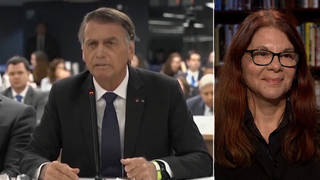
We speak with The New Republic's Kate Aronoff about how President Biden has unveiled steep tariff increases on various Chinese imports, including electric vehicles, which will quadruple from the current tariff rate of 25% to 100%. “What you see … is Biden really looking to lean into a really quite hawkish position on China,” says Aronoff. She explains why Biden is caught between insulating the American auto industry from competition and allowing affordable EVs to enter U.S. markets for climate goals. Aronoff says experts say Biden should work with China on this industry and “to not see this as zero-sum competition. We need to build a lot of clean technology. This is a very large pie, and there's no reason why the United States cannot also have a piece of it.”
Transcript
AMY GOODMAN: This is Democracy Now!, democracynow.org, The War and Peace Report. I’m Amy Goodman, with Juan González.
Last week at the White House, President Biden unveiled steep tariff increases on various Chinese imports, including electric vehicles, which will quadruple from the current tariff rate of 25% to 100%. Biden spoke in a ceremony at the White House surrounded by union workers.
PRESIDENT JOE BIDEN: To make sure American workers and American business and corporations can compete and win in the industries of the future.
AMY GOODMAN: A spokesperson for the Chinese Ministry of Commerce responded, called the tariffs, quote, “typical political manipulation.”
For more, we’re joined by Kate Aronoff, staff writer at The New Republic, where her latest piece is headlined “A 100 Percent Tariff on Chinese Cars Is a Bad Idea.” She’s the author of Overheated: How Capitalism Broke the Planet — and How We Fight Back and co-author of A Planet to Win: Why We Need a Green New Deal.
Kate, welcome back to Democracy Now! Explain Biden’s new position.
KATE ARONOFF: Great to be here.
Yeah, I wouldn’t necessarily call this a new position, so much as an extension of what we’ve seen as sort of an escalation of tensions by the Biden administration, really continuing on from the Trump administration. The tariffs that were put in place on Chinese-made EVs, and maintained by Biden, were put in place by Trump.
And so, what you see is a real attempt to balance a couple of different tensions, right? You have, on the one hand, the Biden administration’s climate goals. You have, on the other, an upcoming election and the sort of real escalation of tensions on both sides of the aisle vis-à-vis China. And then you have these industrial policy goals, right? This idea that we need to revive our manufacturing sector, that the United States needs to catch up. And so, you know, I don’t think that’s an easy balance to strike, between all of those things. But what you see — especially, I think, it’s important to keep in mind November here — is Biden really looking to lean into a really quite hawkish position on China.
JUAN GONZÁLEZ: I wanted to ask you — this Biden administration position that China is dumping on the rest of the world because of its overcapacity in producing electric vehicles and solar panels, I mean, that China has produced a $12,000 electric vehicle, and the United States wants to double what it would cost if it ever came into the United States — isn’t this like the opposite of globalization that the U.S. was trumpeting several years back?
KATE ARONOFF: Yeah. I think there’s a couple of important things to unpack here. So, you will hear Biden administration officials, in particular, use a couple of words that are a bit counterintuitive or just don’t make necessarily sense to people who don’t spend time thinking about trade policy. So, this concept of overcapacity and dumping, right? So, the idea here is that China has intentionally made too many manufactured goods, that are outpacing the sort of domestic demand, and that they are intentionally sort of, quote-unquote, “dumping,” as you said, these products onto the rest of the world, onto, in particular, the United States and the European Union. This is, you know, a real live debate among econ wonks, right? But it is also just sort of the basis of building an export sector, which is something that the United States and something that economies all over the world do in the course of, you know, growing their economies, right? That is not sort of a strange thing to plan for. And we do it all the time, right? So, you know, I think I don’t want to overstate the effect of these sanctions. We are importing very few Chinese goods as it is, and we have very few Chinese cars, EVs in particular.
But, you know, there is this real tension, right? And that if the goal is to deploy clean energy and clean energy technologies as quickly as possible, including electric vehicles, you would theoretically want to have more of those available and more sort of affordable versions of those available. So, like I said, I do think there is a real tension here that Biden does need to strike, and I don’t think it’s necessarily wrong to want the U.S. auto sector to be competitive. But, you know, there is this very big question, I think, hanging over all of this, which is: If these tariffs are meant to protect the U.S. auto sector and protect the Big Three in particular — Ford, GM and Stellantis, which have had a lot of trouble making competitive electric vehicles — what else is happening in order to do this? If you just insulate these companies from competition, that doesn’t, on its own, mean that they are going to be able to compete with Chinese automakers, which have benefited from, you know, at this point, about a decade of really sort of concerted efforts to build up these sectors or its real sort of industrial policy happening in China, some of which we don’t want to replicate, and some of which is really something that is quite admirable in some respects. You know, I don’t want to overstate that, but there is a real sort of fine line to be drawn between things that, you know, are genuinely, quote-unquote, “unfair” trade practices, as the Biden administration says, and things that are just ordinary industrial policy, which are worth taking a look at if we want to do something similar here.
JUAN GONZÁLEZ: We only have about 15 seconds, but what are you calling for instead of tariffs?
KATE ARONOFF: Just a real pragmatic collaboration of the kind that’s already happening here, right? And so, we have Ford, GM, Stellantis are already entering into joint ventures, on quite favorable terms, with Chinese manufacturers who have a real sort of expertise around battery manufacturing, around critical minerals processing. More of that is not a bad thing, although there are bipartisan ban — calls to ban even that sort of low-level collaboration, but just to not see this as zero-sum competition. We need to build a lot of clean technology. This is a very large pie, and there’s no reason why the United States cannot also have a piece of it.
AMY GOODMAN: Kate Aronoff, we want to thank you for being with us from Mexico City, author and staff writer at The New Republic. We’ll link to your piece, “A 100 Percent Tariff on Chinese Cars Is a Bad Idea.” She’s also author of A Planet to Win and Overheated.
That does it for our show. I’m Amy Goodman, with Juan González. Thanks so much for joining us.












Media Options